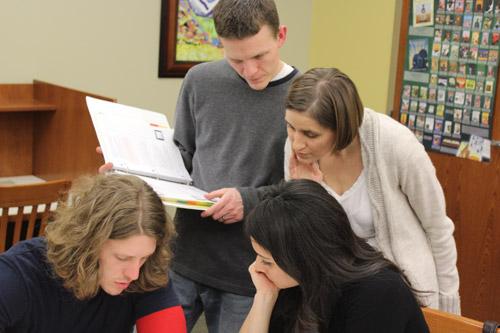

Two years ago, the diocese’s Family Life office was beating the drum for the effectiveness and morality of natural family planning methodologies to an audience of roughly eight couples a month.
Now, 18 months into the wake of the Diocese of Little Rock’s decision to make NFP mandatory for all engaged couples, the office is still trying to drum up numbers, this time of enough teachers to meet demand.
“Before the mandate, we would annually train about 100 couples per year,” said Elizabeth Reha, diocesan family life director. “Last year, that number jumped to almost 300 couples. There’s definitely a need for more teachers.”
Currently, the diocese has about 20 teaching couples. Reha said the areas of need are both cultural and geographical. Southeast Arkansas, for instance, is an area where teachers are in particularly short supply as are Spanish-speaking instructors statewide.
The situation is expected to improve in 2013 with the anticipated certification of around a dozen new teaching couples, many of whom are native Spanish-speakers, Reha said. Couples who don’t have access to an NFP trainer can also travel to attend classes, although most take advantage of online or home study options.
“Southeast Arkansas aside, I haven’t heard of anybody who did not have access to NFP classes,” Reha said. “We’re working on the areas that are struggling in order to make the material as accessible as possible.”
The exact timing of the new trainers’ readiness to teach the roughly two to three classes per year a typical couple will conduct depends on the methodology in which they are being certified. Natural family planning is an umbrella term to describe methodologies used by couples to either encourage or avoid pregnancy, without the use of artificial contraception.
Several organizations have developed curriculum for teaching the methodologies. Each provider’s approach varies slightly from the other, generally in the areas of charting, symbols and organization.
Each provider also maintains its own guidelines for certifying instructors, usually couples, with a training time commitment ranging from a weekend’s instruction with several follow-up communications to a weeklong seminar to home study and completion of a series of testing modules.
Providers for the sympto-thermal method supported by the Diocese of Little Rock include the Couple to Couple League and Northwest Family Services. Providers for the ovulation method include Billings Ovulation Method, Creighton Model Fertility Care Systems, and Family of the Americas.
The resulting diversity of approaches is one of the strengths of the diocesan program, Reha said.
“One of the things I am most proud of is our ability to support such a wide range of providers,” she said. “This helps ensure that our couples are able to find a methodology that speaks to them.”
According to one longtime teacher, that’s exactly what is happening in the classes. Couples who ordinarily would not have attended NFP on their own are finding the compulsory education to be an eye-opening experience.
“There are probably 50 percent of the people in our classes today who wouldn’t have been there if it wasn’t mandatory,” said Evelyn Hart of Little Rock, who with her husband Robert has been a Couple to Couple League instructor for 16 years.
Hart said the couples she encounters are grossly undereducated about the human reproductive system. She said culturally, men tend to think of the subject as “her department” but that the typical bride-to-be is as equally ignorant about her physiology. However, once they start NFP, something surprising happens.
“We started to see this conversion happening,” Hart said. “They come up and tell us ‘It’s so sad that this part of our faith is something that hasn’t been shared.’ It’s a generation that really wants to know the truth.”
Please read our Comments Policy before posting.
Article comments powered by Disqus Mount St. Mary alum rallied community after wreck
Mount St. Mary alum rallied community after wreck
 Deacon served in two Central Arkansas parishes
Deacon served in two Central Arkansas parishes
 Catholic Answers receives backlash for its AI priest
Catholic Answers receives backlash for its AI priest
 Faith at work: How professionals blend belief, career
Faith at work: How professionals blend belief, career
 I knew in fifth grade Jesus was my best friend
I knew in fifth grade Jesus was my best friend
 St. Joseph a model of solidarity with immigrants
St. Joseph a model of solidarity with immigrants
 Two gifts after Jesus’ death: Virgin Mary and Eucharist
Two gifts after Jesus’ death: Virgin Mary and Eucharist
 Why we have an altar, and not just a communion table
Why we have an altar, and not just a communion table
 Pope: Wars should be resolved through nonviolence
Pope: Wars should be resolved through nonviolence